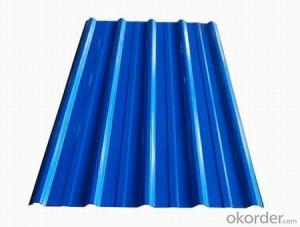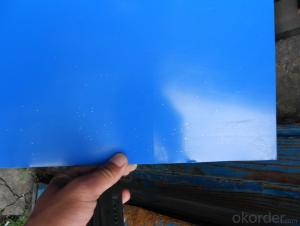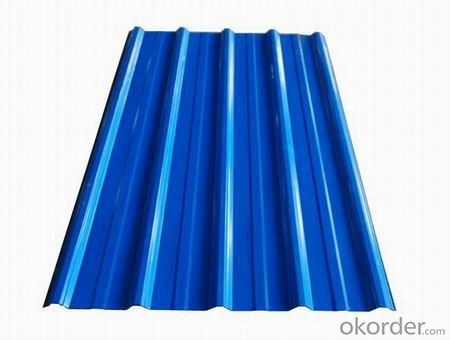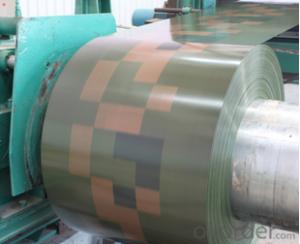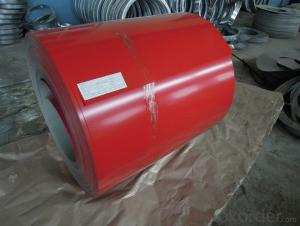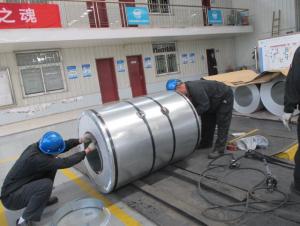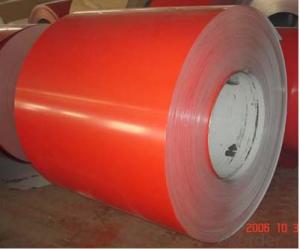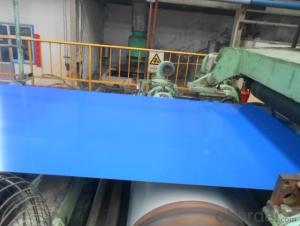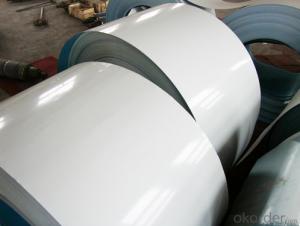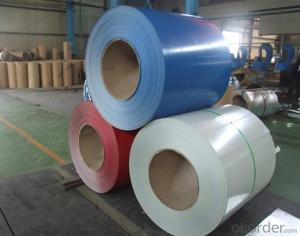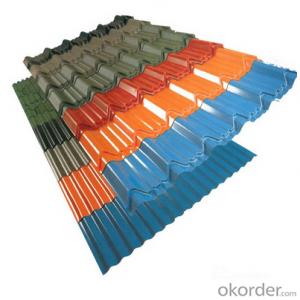PPGI Galvanized Steel Coil Galvalume Coil Corrugated Roofing Sheet
- Loading Port:
- Tianjin
- Payment Terms:
- TT or LC
- Min Order Qty:
- 25 m.t.
- Supply Capability:
- 50000 m.t./month
OKorder Service Pledge
OKorder Financial Service
You Might Also Like
PPGI Galvanized Steel Coil Galvalume Coil sheet
1.Application
Construction | Outside | Workshop, agricultural warehouse, roof panel, wall panel in steel structure in warehouse,corrugated roof, roller shutter door, rainwater drainage pipe, retailer booth |
Inside | factories exhibition hall,doorcase, light steel roof structure, folding screen, elevator, stairway | |
Electrical appliance | Refrigerator, washer, switch cabinet, instrument cabinet, air conditioning, micro-wave oven, bread maker | |
Furniture | Central heating slice, lampshade, chifforobe, desk, bed, locker, bookshelf | |
Carrying trade | Exterior decoration of auto and train, clapboard, container, isolation lairage, isolation board | |
Others | Writing panel, garbage can, billboard, timekeeper, typewriter, instrument panel, weight sensor, photographic equipment | |
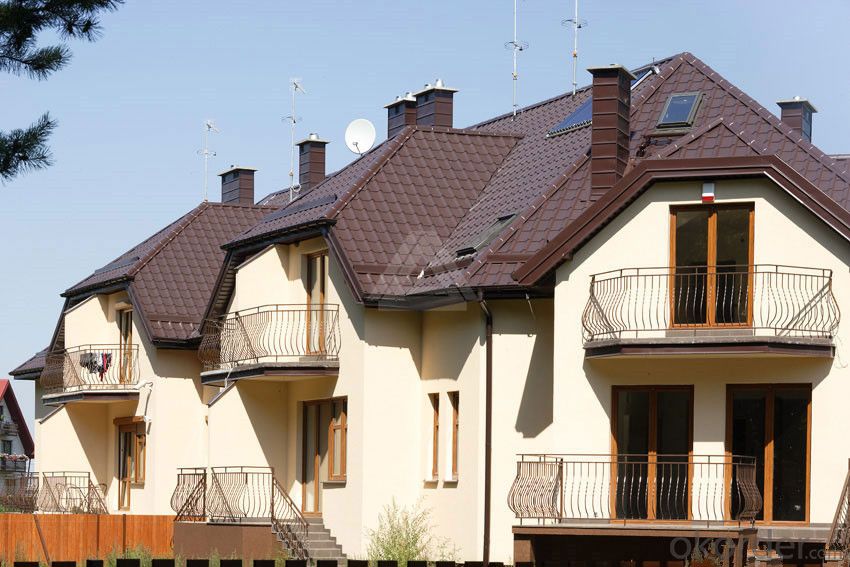
2.Features
With excellent cold-rolling steel strips as base material, it has the advantages of
* Good manufacturing performance
* High impact resistance
* Uniform plating thickness
* High adhesive force
* No peeling after forming
* High corrosion resistance
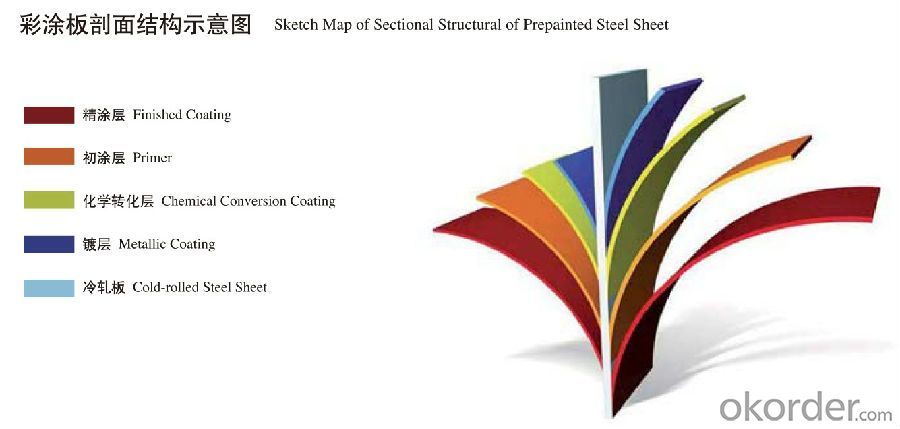
3.Product Details
Base Material | Al-Zn Galvanized Steel Coil.SGLCC |
Top Side | 15-25 microns |
Back Side | 5-8 microns |
Width | 700-1250mm |
Thickness | 0.3-1.0mm ,thickness tolerance: +/- 0.02mm |
Al-Zn Coating | 30-150g/sq.m |
Spangle | Regular/Zero/Big |
Color | All RAL Color,or be customized |
Coil ID | 508mm&610mm |
4. Image:
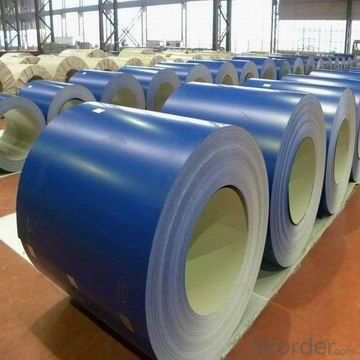
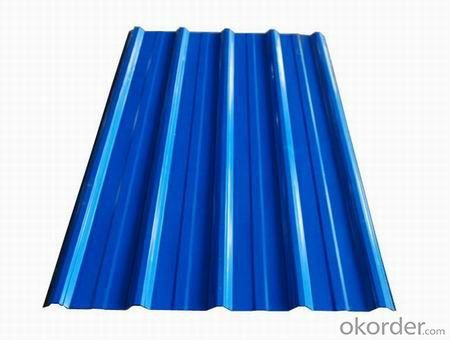
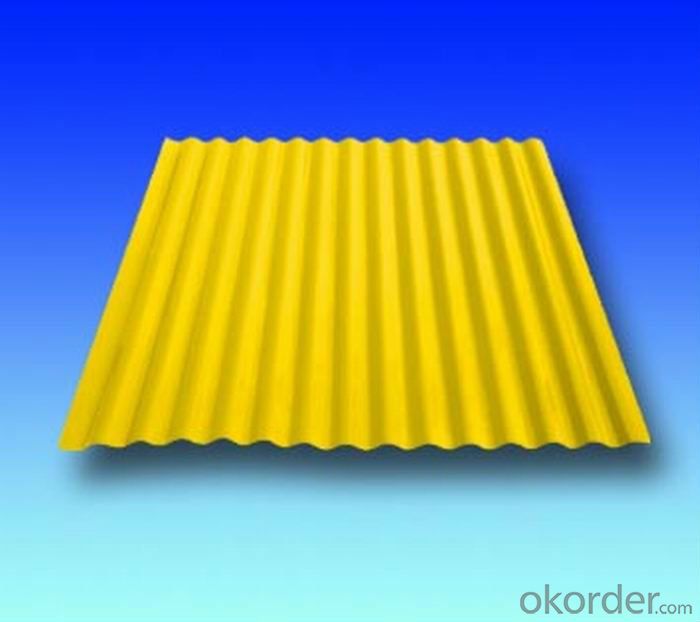
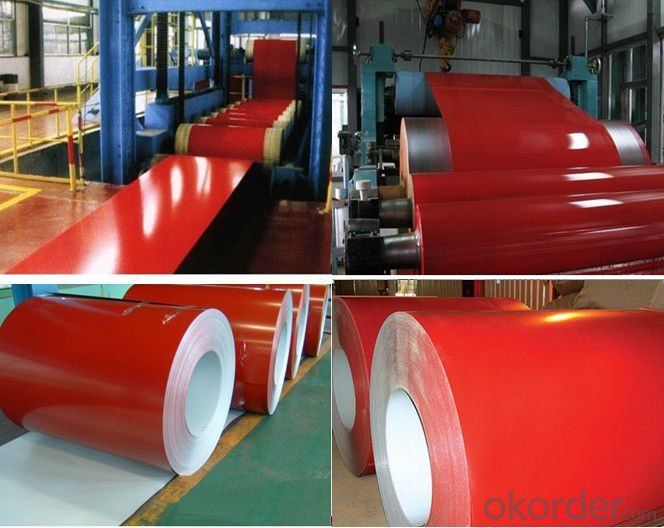
Production Line
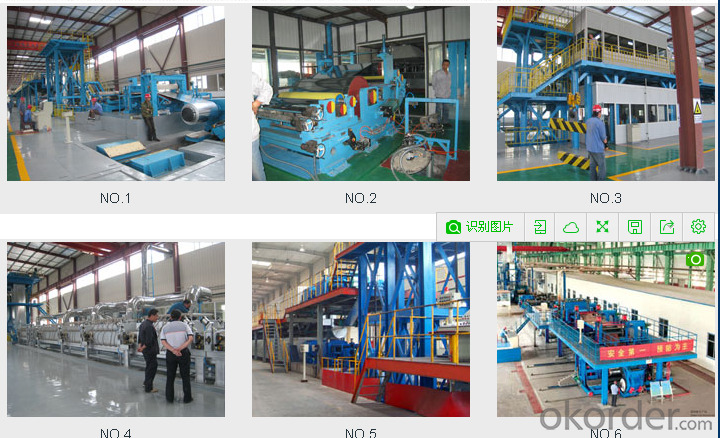
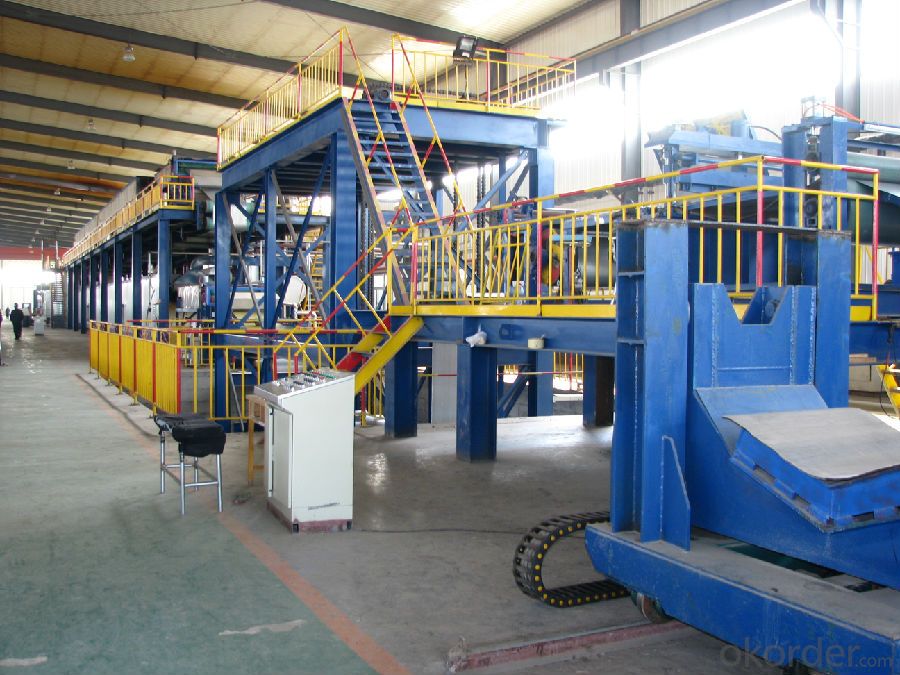
5.FAQ
We have organized several common questions for our clients,may help you sincerely:
①How about your Warranty?
Warranty: 1-Year for the whole light. Warranty is based on correct storage, installation, using and maintenanc
②How to guarantee the quality of the products?
We have established the international advanced quality management system,every link from raw material to final product we have strict quality test;We resolutely put an end to unqualified products flowing into the market. At the same time, we will provide necessary follow-up service assurance.
- Q: What are the different types of edge conditions in steel coils?
- There are several types of edge conditions in steel coils, including mill edge, slit edge, rounded edge, deburred edge, and trimmed edge.
- Q: I'm trying to put together a small structure using galvanized steel electrical conduit (3/4) and I can't seem to find a T-junction conduit coupler anywhere. I'm wondering if I could weld the tubing together, but I'm not sure if I can weld galvanized steel. Also, if I can weld them, is there any special technique that I need to use outside of regular acetelene/oxygen torch and solder?
- Can You Weld Galvanized Steel
- Q: How are steel coils inspected for paint adhesion?
- Steel coils are inspected for paint adhesion using various methods and techniques. One common method is the tape test, where a strip of adhesive tape is pressed onto the painted surface and then quickly pulled off. The tape's adhesion to the paint is then assessed by examining the amount of paint that is removed from the surface. If the paint adheres well to the steel, only a small amount of paint will be lifted off by the tape. Another method used is the crosshatch adhesion test. In this test, a series of parallel cuts are made on the painted surface using a sharp blade, creating a crosshatch pattern. A piece of adhesive tape is then applied over the cuts and quickly pulled off. The amount of paint that is removed from the crosshatched area is evaluated to determine the paint adhesion. Additionally, a visual inspection is often conducted to assess the overall appearance and adhesion of the paint. Inspectors look for any signs of cracking, peeling, or bubbling of the paint, which could indicate poor adhesion. They also check for any areas where the paint may have chipped or flaked off. Furthermore, various laboratory tests can be performed to evaluate the paint adhesion on steel coils. These tests may include techniques such as the pull-off test, where a specialized device is used to measure the force required to pull off a small section of the paint from the surface. Other tests may involve subjecting the painted surface to extreme temperature or humidity conditions to assess how well the paint holds up under different environmental factors. Overall, a combination of visual inspections, tape tests, crosshatch adhesion tests, and laboratory tests are used to thoroughly inspect steel coils for paint adhesion. These tests help ensure that the paint adheres properly to the steel surface, providing a durable and long-lasting finish.
- Q: I know that mild steel is more brittle than cast iron....but that is all.......please help??Thank you in advance......Ruby:D
- Mild steel is iron that has had most of the carbon removed in an open hearth furnace or a Bessemer converter. It is mainly the carbon content that makes iron brittle (iron is brittle, not steel).
- Q: What are the common tests performed on steel coils for quality assurance?
- The common tests performed on steel coils for quality assurance include visual inspection, dimensional analysis, tensile strength testing, hardness testing, and surface quality assessment.
- Q: What are the common methods of painting or coating steel coils?
- One common method of painting or coating steel coils is through the process of coil coating. In coil coating, the steel coils are first cleaned and pre-treated to remove any contaminants and improve adhesion. Then, a primer or a base coat is applied to the coils to provide a foundation for the final coating. This primer helps in protecting the steel from corrosion and improves the overall durability of the coating. After the primer is applied, the steel coils pass through a series of rollers where the topcoat is applied. The topcoat can be a variety of materials such as polyester, polyurethane, or fluoropolymer, depending on the desired properties of the final coating. These topcoats provide the desired color, gloss, and protection against weathering, chemical exposure, and UV radiation. Another common method of painting or coating steel coils is through the process of electrostatic spraying. In this method, a paint or coating material is atomized into fine droplets and then charged with an electrical charge. The steel coils, which are grounded, attract the charged droplets, resulting in an even and controlled application of the paint or coating material. Powder coating is yet another method used for painting or coating steel coils. In this process, a dry powder is electrostatically charged and sprayed onto the steel coils. The charged powder adheres to the surface of the steel due to electrostatic attraction. The coated steel coils are then heated, causing the powder to melt and form a continuous film, providing a durable and resistant coating. Overall, these methods of painting or coating steel coils offer a wide range of options in terms of color, finish, and performance characteristics. The choice of method depends on factors such as the desired appearance, level of protection needed, and the specific requirements of the intended application.
- Q: How are steel coils used in the production of kitchenware?
- Steel coils are used in the production of kitchenware as they are unrolled and cut into specific shapes and sizes to form the base or body of various utensils like pots, pans, and trays. The coils are then shaped, molded, and welded to create the desired kitchenware products, which are further processed for surface finishing, such as polishing or coating, before being ready for use in households or commercial settings.
- Q: What are the different surface treatments for steel coils?
- Steel coils can undergo various surface treatments to achieve different outcomes and applications. Some commonly used treatments include: 1. Hot-dip galvanizing: Steel coils are immersed in molten zinc, which forms a protective layer on the surface. This treatment provides excellent corrosion resistance for outdoor use. 2. Electro-galvanizing: A thin layer of zinc is electroplated onto the steel coils. It offers good corrosion resistance and is suitable for indoor applications. 3. Powder coating: Dry powder is applied to the surface and heated to form a durable coating. It provides excellent corrosion resistance and comes in different colors and finishes. 4. Paint coating: Steel coils can be coated with liquid paint, offering both corrosion resistance and aesthetic appeal. The thickness and finish can be customized according to the desired look and level of protection. 5. Phosphating: Steel coils are immersed in a phosphate solution, creating a thin layer that enhances paint adhesion and improves corrosion resistance. 6. Chromate conversion coating: Steel coils are immersed in a solution containing chromium salts, providing excellent corrosion resistance and acting as a primer for subsequent paint or powder coating. 7. Zinc-nickel plating: A layer of zinc-nickel alloy is electroplated onto the steel coils, offering superior corrosion resistance compared to pure zinc plating and is suitable for demanding environments. These are just a few examples of the many available surface treatments for steel coils. The choice depends on factors such as application, desired corrosion resistance, aesthetic requirements, and budget. It is important to carefully consider project needs and consult with experts to determine the most suitable treatment.
- Q: Please explain why steel is denser than wood.
- The atoms in steel are more tightly packed. They have a greater mass in a smaller volume than wood. Basically, if you take 100 g of steel and 100 g of wood, the piece of steel will be smaller (less volume) than wood and therefore more dense. Density = Mass/Volume
- Q: Question about steel type used in bridges.?
- Do you mean galvanized steel?
Send your message to us
PPGI Galvanized Steel Coil Galvalume Coil Corrugated Roofing Sheet
- Loading Port:
- Tianjin
- Payment Terms:
- TT or LC
- Min Order Qty:
- 25 m.t.
- Supply Capability:
- 50000 m.t./month
OKorder Service Pledge
OKorder Financial Service
Similar products
Hot products
Hot Searches
Related keywords
